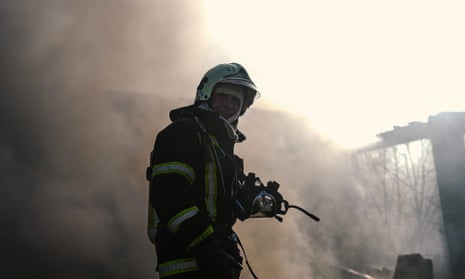Russia-Ukraine war: Ukraine restricts power use; ‘abundant evidence’ Russia using Iranian drones, says US – live
Key events

Dan Sabbagh
The Guardian’s Dan Sabbagh offers this analysis on the impact on the country’s energy supply, noting that civilians are likely to be the biggest losers.
Politicians in Ukraine have been warning for months now that Russia would target the energy grid in the run up to winter, where temperatures can drop to -10C and even -20C. In some frontline areas, such as Donbas, there are already no gas supplies for heating the apartment blocks where so many live.
Quietly around the country there have been efforts to ensure hospitals and military sites have backup generators available. But it will not be enough for civilians and it is clear that the situation – and the bleak initial effectiveness of the Russian strategy – could make for a very difficult period.
Some experts have feared there could even be a renewed migration crisis, as people seek to leave the country in pursuit of warmth.
Ensuring the continuity of supply of electricity and warmth to the military has been a priority for Kyiv, while any frontline difficulties the Ukrainians face are likely to be shared by the Russian invaders too.
That means it is civilians – and civilian morale – that will bear the brunt, a familiar Russian strategy to prioritise psychological effects over battlefield success.
But a Russian attempt to stoke a humanitarian crisis in the winter will also impose further costs on both Ukraine and its western supporters. The rapid success of the attacks on power stations suggest the coming months will be hard, unless an urgent military solution can be found.
Russia targeting Ukraine’s energy supply
A barrage of Russian missile and drone attacks has destroyed power plants across Ukraine just before the winter sets in.
Nearly a third of Ukraine’s power stations have been destroyed by Russian attacks since Monday last week, Ukraine’s president Volodymyr Zelenskiy said.
Kyrylo Tymoshenko, the deputy head of the presidential office, said energy infrastructure and power supplies are being targeted, describing the situation across the country as critical. “Our regions are dependent on one another … it’s necessary for the whole country to prepare for electricity, water and heating outages,” he told Ukrainian television earlier in the week.
Another kind of Russian terrorist attacks: targeting 🇺🇦 energy & critical infrastructure. Since Oct 10, 30% of Ukraine’s power stations have been destroyed, causing massive blackouts across the country. No space left for negotiations with Putin’s regime. @United24media pic.twitter.com/LN4A2GYgCK
— Володимир Зеленський (@ZelenskyyUa) October 18, 2022
Three more energy facilities were destroyed on Wednesday, part of a wave of such strikes since 10 October, Ukraine’s president Volodymyr Zelenskiy said in his latest address.
The latest to be hit was a major thermal power station in the city of Burshtyn in western Ukraine, the region’s governor said.
Ukrainian officials are working to create mobile power points as Zelenskiy held a “strategic meeting” with senior officials on Wednesday to discuss measures to “eliminate the consequences in the event of a breakdown of the energy system of Ukraine”, he said on Telegram.
The head of the European Commission, Ursula von der Leyen, described Russia’s strikes on critical energy infrastructure as “acts of pure terror” that amount to war crimes in remarks to the European parliament on Wednesday.
Hundreds of thousands of Ukrainians have been left without power or water as a result of Russian strikes.

Ukraine curbs power usage
Ukraine will begin restricting electricity supplies across the country starting from 7am today in response to Russia’s strikes against its energy infrastructure.
Ukrainians will now need to prepare for “rolling blackouts” and people will have to conserve energy, the deputy head of the president’s office, Kyrylo Tymoshenko, warned. In a Telegram update posted late on Wednesday evening, he said:
Starting from 7am to 11pm, it is necessary to minimise the use of electricity.
This applies to residents of ALL regions of the country. If this is not done, you should prepare for temporary shutdowns.”
The use of street lighting will be limited in cities and the country needed, he added, to be prepared for “a hard winter”.
Ukraine’s national energy company also urged citizens to “charge everything” by 7am (4am GMT) on Thursday with outages of up to four hours at a time expected to affect the whole country.
Phones, power banks, torches and batteries need to be charged, grid operator Ukrenergo urged.
Summary and welcome
Hello and welcome back to the Guardian’s live coverage of the war in Ukraine. I’m Samantha Lock and I’ll be bringing you all the latest developments as they unfold over the next few hours.
Ukraine will today begin restricting electricity supplies across the country starting from 7am in response to Russia’s strikes against its energy infrastructure. Three more energy facilities were destroyed on Wednesday, Ukraine’s president Volodymyr Zelenskiy said in his latest address.
The United States, Britain and France have said there is “abundant evidence” Russia is using Iranian drones to strike civilians in Ukraine during a meeting of the UN security council on Wednesday. EU governments are also set to impose sanctions on eight people and entities over the alleged use of Iranian-made drones.
Here are all the latest lines you may have missed:
-
Vladimir Putin declared martial law in the four provinces of Ukraine where Russia controls territory. The law gives far-reaching emergency powers to the Russian-installed heads of Luhansk, Donetsk, Zaporizhzhia and Kherson provinces, which Russia recently proclaimed as annexed after sham referendums. Ukraine’s presidential adviser Mykhailo Podolyak described the announcement as the “pseudo-legalisation of looting of Ukrainians’ property”.
-
Putin has also ordered an “economic mobilisation” in six provinces that border Ukraine, plus Crimea and Sevastopol, which Russia illegally annexed in 2014. In televised remarks he said he was granting additional authority to the regional leaders of all Russian provinces to maintain public order and increase production in support of Moscow’s war. The law also limits the freedom to move in and out of the eight provinces.
-
Russian officials have warned of a Ukrainian assault on Kherson amid plans to “resettle” civilians. The Russian-installed head of the key southern city Vladimir Saldo spoke of plans to move up to 60,000 people across the Dnieper River and into Russia over the next six days fearing a Ukrainian counteroffensive. Images of people using boats to flee the city were broadcast by Russian state TV.
-
Ukrainian officials described Russia’s announcements as “a propaganda show” and told people not to comply with the evacuation request. A number have reported receiving mass text messages warning the city would be shelled and informing them that buses would be leaving from the port from 7am on Thursday. Andriy Yermak, chief of staff to the Ukrainian president, described Russian announcements as “a propaganda show” as Kyiv said the population transfers amounted to “deportations”.
-
Russia continues to launch new strikes against Ukraine’s energy infrastructure with three energy facilities destroyed on Wednesday, Ukraine’s president Volodymyr Zelenskiy said in his latest address, adding that Ukrainian officials are working to create mobile power points. Russian airstrikes have destroyed 30% of Ukraine’s power stations since 10 October, causing massive blackouts across the country, he said. Ukraine will restrict electricity supplies across the country starting from 7am on Thursday.
-
Russia’s strikes on critical energy infrastructure are “acts of pure terror” that amount to war crimes, the head of the European Commission has said. Ursula von der Leyen’s remarks to the European parliament on Wednesday came after hundreds of thousands of Ukrainians were left without power or water as a result of Russian strikes.
-
Zelenskiy spoke of “significant results” in downing Iranian drones, claiming 233 Shahed UAVs and dozens of missiles were shot down during the month. Several Russian missiles were shot down over Kyiv on Wednesday afternoon, its mayor, Vitalii Klitschko, said. Greek diplomats have confirmed that the country’s foreign minister, Nikos Dendias, who is visiting Ukraine, was forced to seek refuge in a bomb shelter in Kyiv.
-
The cost to Ukraine of downing “kamikaze” drones vastly exceeds the sums paid by Russia in sourcing and launching the cheap Iranian-made technology, analysis suggests. The total cost to Russia of the failed drone attacks unleashed on Ukraine in recent weeks is estimated by military analysts to be between $11.66m (£10.36m) and $17.9m (£15.9m). The estimated cost to Ukraine to bring down the drones stands at more than $28.14m (£25m).
-
The EU plans to impose sanctions on three senior Iranian military commanders and the company that develops drones believed to have been used in Russia’s attacks on Ukraine. The draft sanctions list, seen by the Guardian, is expected to be agreed within days, indicating EU ministers do not believe Iran’s denials that it has supplied Russia with the low-flying lethal weapons.
-
Russia will reassess its cooperation with UN secretary-general António Guterres and his staff if Guterres sends experts to Ukraine to inspect downed drones that Ukraine and the west assert were made in Iran, Russia’s deputy UN ambassador Dmitry Polyanskiy told reporters on Wednesday.
-
Putin will face “severe consequences” if he uses nuclear weapons in the war in Ukraine, Downing Street has said. Britain’s defence secretary, Ben Wallace, has been in Washington for talks with his US counterpart amid reports the Russian leader could detonate a nuclear warhead over the Black Sea.
-
The US has imposed new sanctions on Russia, targeting a network that Washington accused of procuring military and dual-use technologies from US manufacturers and illegally supplying them to Russia for its war in Ukraine. Some of the equipment was recovered on battlefields in Ukraine, the justice department said.
-
The European parliament awarded the people of Ukraine its annual Sakharov prize for freedom of thought to honour their fight against Russia’s invasion. “They are standing up for what they believe in. Fighting for our values. Protecting democracy, freedom and rule of law. Risking their lives for us,” the European parliament president, Roberta Metsola, said.

[ad_2]
Share this news on your Fb,Twitter and Whatsapp
Times News Network:Latest News Headlines
Times News Network||Health||New York||USA News||Technology||World News